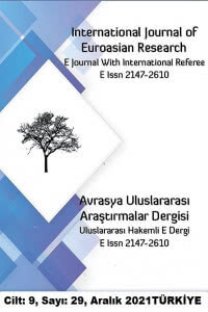Ian Mcewan’ın Benim Gibi Makineler Romanında Simülasyon Yoluyla Anlamı Şekillendirme ve Alternatif Gerçeklik Oluşturma
Anlamın oluşturulması, Yapay Zeka, Ian McEwan, Benim Gibi Makineler., Simülasyon
Shaping The Meaning Through Simulation and Constructing Alternative Reality in Ian Mcewan’s Machines Like Me
___
- Bar-Yosef, Eitan. 2022. “Dr. Perowne and Mr. Baxter: Gothic Resonances in Ian McEwan’s Saturday”. ANQ: A Quarterly Journal of Short Articles, Notes and Reviews, 35:1, 75-81.
- Baudrillard, Jean. 1994. Simulacra and Simulation. (S. Glaser, Trans.). University of Michigan Press.
- Childs, Peter. 2007. Ian McEwan’s Enduring Love. Routledge.
- Cormack, Alistair. 2013. “Postmodernism and Ethics of Fiction in Atonement”, 70-82, in Sebastian Groes’s Ian McEwan. Bloomsbury Academic.
- Ferguson, R. James. 2013. “Great traditions and grand narratives.” Culture Mandala, 10(2): 5910.
- Fukuyama, Francis. 2022. Liberalism and Its Discontents. Profile Books Ltd.
- Green, Susan. 2010. “Consciousness and Ian McEwan's Saturday: ‘What Henry Knows’”. English Studies, 91:1, 58-73.
- Groes, Sebastian. 2013. Ian McEwan. Bloomsbury Academic.
- Head, Dominic. 2014. Ian McEwan. Manchester University Press
- Hodgson, Thomas. 2020. “AI: More Than Human, Barbican, 6 May–26 August.” Sound Studies, 6:1,: 99-103.
- Holland, Rachel. 2017. “Reality Check: Ian McEwan’s Rational Fictions”. Critique: Studies in Contemporary Fiction. 58:4, 387-400.
- Hutcheon, Linda. 2001. The politics of postmodernism. New York: Routledge.
- Hutcheon, Linda. 2004. A poetics of postmodernism: History, theory, fiction. New York: Routledge.
- Ionescu, Andrei. 2017. “A Manifesto Against Failures of Understanding: Ian McEwan’s Atonement”. Critique: Studies in Contemporary Fiction, 58:5, 600-618.
- Jameson, Fredric. 1984. “Foreword”, The postmodern condition: A report on knowledge. (Vol. 10). U of Minnesota Press.
- Lyotard, Jean François. 1984. The postmodern condition: A report on knowledge. (G. Bennington & B. Massumi, Trans.) (Vol. 10), USA: Minnesota Press.
- Malcolm, David. 2002. Understanding Ian McEwan. University of South Carolina Press.
- Matthews, Graham John. 2019. “A State of Mathematical Grace: Risk, Expertise and Ontological Insecurity in Ian McEwan’s Enduring Love”. English Studies, 100:4, 478-494.
- McEwan, Ian. 2019. Machines Like Me. Penguin.
- Morrison, Jago. 2001. “Narration and Unease in Ian McEwan’s Later Fiction”. Critique: Studies in Contemporary Fiction, 42:3, 253-268.
- Nayebpour, Karam. 2017. Mind Presentation in Ian McEwan’s Fiction: Consciousness and the Presentation of Character in Amsterdam, Atonement, and On Chesil Beach. Ibidem-Verlag.
- Nicol, Bran. 2009. The Cambridge Introduction to Postmodern Fiction. UK: Cambridge University Press.
- Oppermann, Serpil. 1998. “Historicist Inquiry in The New Historicism and British Historiographic Metafiction.” Hacettepe University Journal of Faculty of Letters, 15 (1): 39-52.
- Qouzloo, Hourieh Maleki & Sadjadi, Bakhtiar. 2021. “The manifestation of Lacanian desire in Ian McEwan’s Atonement and Saturday”. Cogent Arts & Humanities, 8:1, 1892904.
- Tan, Ian. 2022. “Registering Trauma and the Construction of Narrative in Ian McEwan’s The Innocent”. Critique: Studies in Contemporary Fiction. DOI: 10.1080/00111619.2022.2066502
- Van Raaij, W. Fred. 1993. “Postmodern consumption”. Journal of economic psychology, 14(3): 541-563.
- White, Hayden. 2014. Metahistory: The historical imagination in nineteenth-century Europe. John Hopkins University Press.
- ISSN: 2147-2610
- Yayın Aralığı: 4
- Başlangıç: 2012
- Yayıncı: Kürşat Öncül
Gelin Kaynana İlişkisinde Akrabalık Bağının Yeri ve Rolü
Klasik Türk Şiirinde “İrem” Kelimesinin Kullanımı Üzerine
Büyük Selçuklu Devleti’nde Bir Emir: Hâcib Erdem ve Faaliyetleri
Otantik Liderlik, Kolektif Etkinlik ve Performans İlişkisi
Türk ve Kore Kültüründe Mağara ve Mitolojik Ana İlişkilendirmesi Üzerine Bir İnceleme
Kilikya Ermenilerinin Çukurova’daki İktisadî Faaliyetleri
Bizans’a Damat Olan Türk Sultan: I.Gıyaseddin Keyhüsrev ve İktidardan Uzak Yılları
